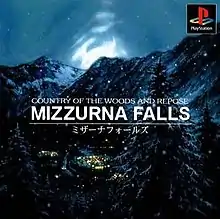Mizzurna Falls
Mizzurna Falls[lower-alpha 1] is a 1998 Japanese video game developed and published by Human Entertainment for the PlayStation. The game is one of the first open world adventure games ever made and focuses on the search for a lost classmate in a small rural American town.
| Mizzurna Falls | |
|---|---|
 | |
| Developer(s) | Human Entertainment |
| Publisher(s) | Human Entertainment |
| Director(s) | Taichi Ishizuka |
| Writer(s) | Taichi Ishizuka |
| Platform(s) | PlayStation |
| Release |
|
| Genre(s) | Adventure |
| Mode(s) | Single-player |
The game has never been localized outside of Japan, but fan translation projects have attempted to translate it.
Plot
The game takes place in Mizzurna Falls, a fictional town in Colorado near the Rocky mountains.[1][2] On Christmas Day 1995 a young girl, Kathy Flannery is discovered unconscious in the forest, apparently attacked by a bear. Soon after, high school student Emma Rowland goes missing. Emma's classmate Matthew Williams becomes involved in the mystery surrounding the disappearance and the dark secrets of the town.
Gameplay
The player has seven days to explore the town and countryside talking to the residents in order to solve the mystery.[3][4] One in game hour is around five minutes in real time.[5] The strict seven day time limit makes it difficult to see all the events and get the best of the three endings. The player can save the game by sleeping for either one or five in game hours. The game features the "tank style" movement controls made famous by Resident Evil, fighting and shooting systems and quick time events. The game also features a full weather cycle and the residents of the town have individual daily routines. The player has access to a Volkswagen Beetle and a boat to move around town quickly. Matthew can eat at the local diners, and must keep his car fueled. Matthew can also use his mobile phone to call other characters and certain businesses in the town.
Development and release
It is the only game by its writer and director Taichi Ishizuka, who followed this by moving to Canada as a nature guide.[6] The game is reminiscent of Twin Peaks.[2]
The game was released on December 23, 1998 in Japan for the Sony PlayStation, and was published by Human Entertainment themselves.[4][7] The game was never localized nor published in the West.[6]
Reception and legacy
Upon release, four reviewers from Famitsu gave it a score of 22 out of 40.[4]
Its legacy is in being one of the first open world video games.[8] Rolling Stone commented that the title was "quirky, weird, and rife with references to a cornucopia of media, namely Twin Peaks, and traces of it can now be seen in cult favorites like Deadly Premonition."[9]
Localization attempts
For a while the game was "little more than a 20-year-old curiosity" according to Waypoint, which could only be played via poor emulation or by purchasing a Japanese version of the game.[6] However, in 2017 Tokyo-based freelance translator Resident Evie translated the script into English as part of a playthrough project.[6] She also set up the Tumblr Project Mizzurna, a hub for discussions and content around the game.[6] Evie noted that "The game was so innovative that it was even slightly broken".[10]
In mid-2019, an unofficial English localization patch based on Evie's translation was released in an incomplete state. However, the patch was quickly pulled off various sites due to a copyright complaint, as the publisher had compiled all the code from the authors without permission.[11]
In late 2019, a game translator under the pseudonym "Mr.Nobody" published a Spanish translation patch based on the aforementioned English patch, making it possible to play the game in Spanish.
References
- "Archived copy". Archived from the original on 2019-05-27. Retrieved 2020-03-26.CS1 maint: archived copy as title (link)
- "【特集】『初代プレステの"風変わり"なアドベンチャーゲーム』7選 3ページ目". Game*Spark - 国内・海外ゲーム情報サイト (in Japanese). Archived from the original on 2018-03-03. Retrieved 2019-04-30.
- McElroy, Justin (2016-01-18). "If Twin Peaks had been a PSone game, it would have been Mizzurna Falls". Polygon. Archived from the original on 2019-04-05. Retrieved 2019-04-16.
- "ミザーナフォールズ [PS] / ファミ通.com". www.famitsu.com. Retrieved 2019-04-30.
- "Archived copy". Archived from the original on 2019-05-27. Retrieved 2020-03-26.CS1 maint: archived copy as title (link)
- Walker, Austin; Haske, Steve (2017-09-01). "What Made This Fan Translate an Obscure 1998 'Twin Peaks'-Inspired PS1 Game". Waypoint. Archived from the original on 2019-04-05. Retrieved 2019-04-16.
- "ミザーナフォールズ | ソフトウェアカタログ | プレイステーション® オフィシャルサイト". www.jp.playstation.com. Archived from the original on 2019-04-03. Retrieved 2019-04-20.
- Jr, Patrick Hickey (2018-04-04). The Minds Behind the Games: Interviews with Cult and Classic Video Game Developers. McFarland. ISBN 9781476631233.
- Vincent, Brittany (February 19, 2018). "Why Lynchian-Classic 'Mizzurna Falls' Remains Untranslated". Rolling Stone. Archived from the original on February 19, 2018.
- Dalsum, Sander van (2016-02-25). "Mizzurna Falls is de beste Twin Peaks game die je nooit hebt gespeeld". Motherboard (in Dutch). Archived from the original on 2019-04-16. Retrieved 2019-04-16.
- "An Online Feud Killed a Gaming Oddity People Had Waited 21 Years For". VICE. 2019-08-06. Retrieved 2020-05-18.
